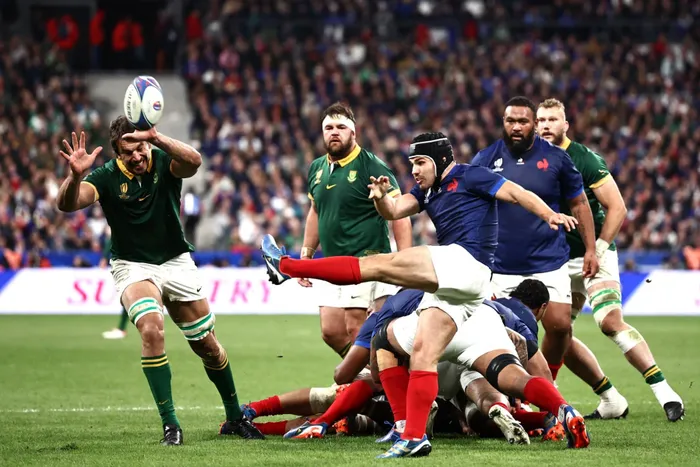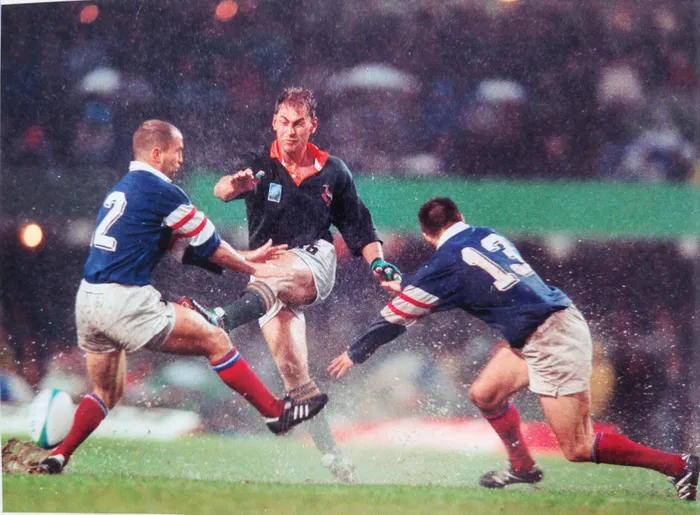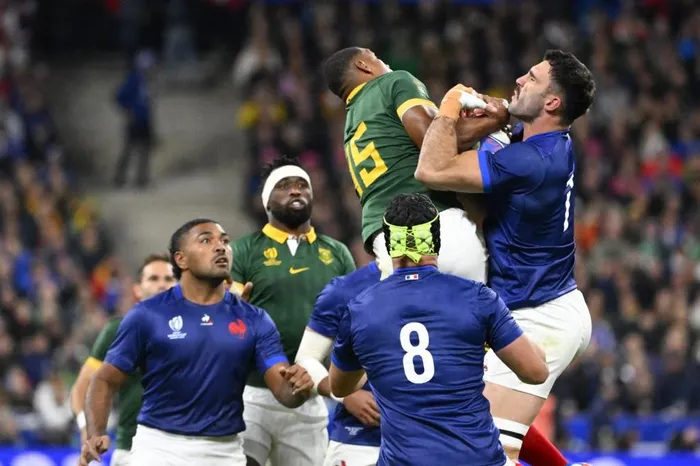
Springbok lock Eben Etzebeth attempts to charge down a clearance kick France's scrumhalf and captain Antoine Dupont) during the 2023 Rugby World Cup quarter-final at the Stade de France.
Image: AFP
The build-up to Saturday night’s rematch between the Springboks and France brought back a flood of memories of the epic quarter-final between the teams at the Stade de France. It was a game from the gods, beauty and brutality blended into a gift from rugby heaven. Across the globe, it was spontaneously proclaimed as an all-time classic, one for the ages.
The compelling appeal of knock-out matches is that there has to be a winner and a loser. When the referee tosses the pre-game coin into the air before the opposing captains, triumph shines on one side, on the other lurks despair.
No spectator knew until the last second just how the coin would land for France and South Africa. The coin might well have landed on its rim before tantalisingly toppling the way it did. And it would be the French flag hanging at half-mast from the Eiffel Tower while on the Monday morning South Africans went to work with sore heads but happy hearts.
The truth is that the rugby history between the countries has never been remotely dull. There was an aged gentleman in a suite at the Stade de France for the quarter-final who can testify to that because he has seen much of it.
The 93-year-old in question is Lucien Mias, who was at the heart of the upset of the century when France toured South Africa for the first time in 1958.
This was an era when the Boks were invincible on home soil. They had not lost a series in South Africa since the 1890s and were expected to flog the French. The first Test was drawn at Newlands, a shock in itself, and a fierce Boklash was expected at Ellis Park a week later.
But France astonished the rugby world by winning 9–5, led by a Man of the Match performance by lock forward Mias, a doctor who prescribed his own medicine when overcome with nerves on the eve of the match. He polished off a bottle of brandy in the hotel bar and sang the stirring French national anthem into the early hours.
The victory over the Boks was joyously celebrated in France and it would spawn a book, The Grand Victory of the French Fifteen, by Denis Lalanne.
Mias reportedly told his men that they had to literally fight the (allegedly) dirty Boks “even if it means we all die in a foreign land.”
Another star for the French was their slender fly-half, Pierre Danos. His sizzling sidesteps bamboozled the brawny Boks and he famously said afterwards: “You get two kinds of rugby players — those who play pianos and those who shift them.”
Touché, Monsieur Danos. And he could have been describing the French captain of 2023, Antoine Dupont, the chief orchestrator in a superb French side since 2017. The brilliant scrum-half was the World Player of the Year in 2021 and had won three Six Nations Player of the Tournament awards before the World Cup.
Maybe it is the unpredictable French temperament that bewilders the more stoic Springboks. On their good days, the French can be unplayable, but their emotions can fluctuate to the other extreme and they can capitulate if uninspired.
Dare we say this was the case in the 2024 Six Nations, where the French were insipid compared to their sparkling performances prior to the World Cup? It was as if a hot air balloon above Paris had been pierced the moment referee Ben O’Keefe called time on the quarter-final… but more about that later.
Let’s talk about the French relationship with the Springboks since the Grand Slam-winning Boks of 1913 played an exhibition match in Bordeaux.
The French were new to the game and so impressed with the Boks that they would stop and applaud a good move. When the Springbok full-back, Duggie Morkel, kicked a 55m drop goal, his opposite number planted a kiss on his forehead.
The French team persuaded Morkel to part with his boots and they remain in a Bordeaux museum to this day.
After France’s great start in South Africa in 1958, they have gone on to beat the Springboks as many times in South Africa (six) as they have in France, also six. They have also drawn four times in South Africa, which means the Boks have beaten them only 14 times in 24 matches in SA, for an unflattering win record of 58 percent.
But of the tight tussles, few come close to the riveting theatre that unfolded in drenched Durban in the World Cup semi-final of 1995.

French centre Thierry Lacroix is too late to prevent Springbok fullback Andre Joubert from kicking during the rain-drenched 1995 World Cup semi-final in Durban.
Image: Supplied
The match was almost cancelled because Welsh referee Derek Bevan was concerned that a collapsed scrum could result in a drowning — the pitch was that sodden.
If the match had been called off, France would have advanced to the final because of their superior disciplinary record in the tournament (Bok hooker James Dalton had been red-carded in an earlier match against Canada).
SARU president Louis Luyt refused to negotiate with the officials and warned that there would be a riot if the game was abandoned. After a 90-minute delay, the curtain went up for 80 minutes of pure drama.
France came within an inch of scoring what would have been the winning try, with time almost up, following a series of attacking scrums in the Bok 22. The hulking Abdelatif Benazzi had launched a charge just three metres out, but James Small flung himself across the tryline, kamikaze-style, to prevent the No 8 from grounding the ball on the line.
To this day the French swear Benazzi scored, and in the later days of the TMO they might have been proved right.
At the final whistle, the forlorn Frenchmen collapsed in the puddles and sobbed. They were so close to making the final, but so far.

Damian Willemse competes for a high ball during Rugby World Cup 2023 quarter-final against France.
Image: AFP
Twenty-three years later, a similar drama would unfold, this time at the Stade de France, in a World Cup quarter-final that easily makes the Top Ten for greatest matches in the history of the game. Once more, there was rain, but nothing like the Durban monsoon.
In the ’95 semi, one more Benazzi centimetre and France would have won. In 2023, just one point separated the sides. For French supporters, the night of October 21 was depressing déjà vu.
The French players were scattered across the Stade de France surface, most on their hands and knees with heads bowed. They were paralysed by despair and exhaustion. Later, Dupont wandered among his teammates with his hands clasped on his head. The television cameras did not spare him, his face a mask of disbelief that gradually gave way to anguish.
For four years, Dupont had magnificently led a French side that looked en route to Paris’ Arc de Triomphe, the Webb Ellis Cup theirs at last… until the last match of a weekend of extraordinary quarter-final drama where the French flair foundered on Springbok granite.
This story is based on a chapter from Mike Greenaway’s best-selling book, The Fireside Springbok. He also penned Bok to Bok, the story of the Springboks’ triumph at the 2023 World Cup.
Related Topics: